Helen H. Moore's Blog, page 713
July 20, 2016
Politics are a family affair: What you need to know about Trump’s sons Eric and Don Jr.
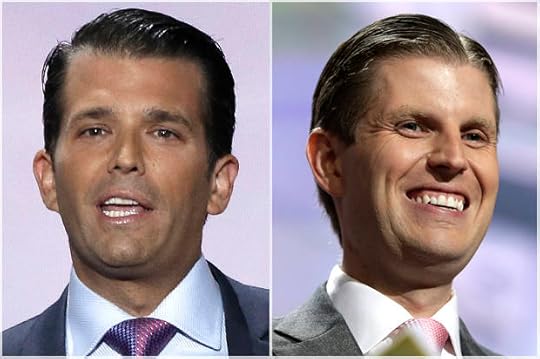
Donald J. Trump, Jr.; Eric Trump (Credit: Reuters/Mike Segar/AP/John Locher)
Republican presidential nominee Donald Trump has five children, all of whom except his 10-year-old son will have delivered speeches by the end of the Republican National Convention. Last night, his oldest son, Donald Trump Jr., delivered a speech, and tonight, Eric Trump will take the stage. Here are some things you need to know about them.
Eric Trump
1. In an interview with The New York Times in 2006, he said, “In a way, [Donald Jr.] raised me. My father, I love and I appreciate, but he always worked 24 hours a day.” This seems to fly in the face of the story Tiffany Trump told last night of her father being extremely present in her life.
2. Donald Jr. and Eric are both big game trophy hunters. In 2012 they came under fire when pictures of them on an African safari surfaced on the internet. Trump Sr. told TMZ at the time, “My sons love hunting. They’re hunters and they’ve become good at it. I am not a believer in hunting and I’m surprised they like it.”
3. While all three of the oldest children work for Trump, Eric is in charge of the Trump winery and golf courses (like the one recently opened in Scotland, site of the Trump news conference on Brexit). Eric was named Rising Star of the Year in 2013 by Wine Enthusiast Magazine.
4. Eric married Lara Yunaska, a producer for CBS Inside Edition, in 2014 at the same beach resort in Florida where his older brother got married.
5. Eric Trump promised ABC News that he will be using “zero” speech writers. This follows Melania Trump’s fairly blatant copying of Michelle Obama’s 2008 speech, as well as Donald Jr.’s lifted metaphor.
Don Jr.
1. Don Jr. is married to model Vanessa Haydon, and the couple has five children. Haydon was introduced to Don Jr. twice in the same night by Donald Sr., but it took a third introduction by a mutual friend weeks later before they actually started dating.
2. One of his sons is named for his maternal grandfather, Milos, with whom he was very close. In fact, it was Milos who gave Don and Eric their love for hunting.
3. The three oldest Trump children all work for the Trump Organization and none of them were really the rich-kid wild child you might expect. Don Jr. credits this to his parents making them earn their pocket money as teens: “If there was something we wanted, we had to earn it. Even in college, we were very fiscally responsible. I had 300 bucks a month — anything I wanted beyond that, I had to work for.”
4. That being said, Don Jr. took a year off after college and stayed in Aspen, Colo., drinking and partying. “I had a great time,” he says, “but your brain starts to atrophy. It just wasn’t enough for me.”
5. Don Jr. was featured on “The Apprentice” as a boardroom advisor, along with his brother and sister, Ivanka Trump. “It’s an hour-long infomercial,” Jr. said of the show once. “People pay millions of dollars for a 30-second advertisement, [and] we get to be on it for a full hour promoting all our projects.”
July 19, 2016
Ben Carson plays the Lucifer card: Strange attack on Hillary leaves heads shaking at RNC
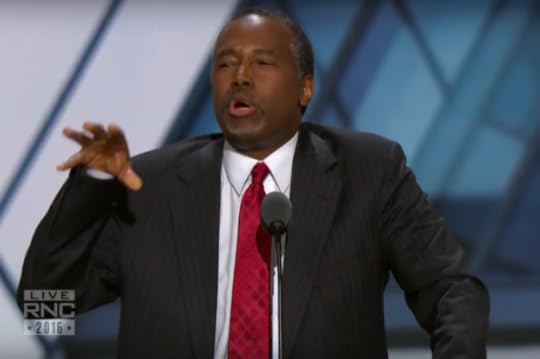
Renowned neurosurgeon and one-time GOP presidential primary frontrunner Dr. Ben Carson spoke at the Republican National Convention Tuesday night.
Carson accidentally announced his candidacy during a live radio interview in May of last year. He would remain on the trail for the ten months before suspending his campaign in March following a dismal Super Tuesday showing.
For a moment in November, Carson led GOP nominee Donald Trump by six points nationally, according to a NBC/Wall Street Journal poll.
One week after suspending his campaign, Carson endorsed Trump, who at one time implicitly likened the doctor to a “child molester.” Of such insults, Carson said in his endorsement, “That was political stuff.”
Republicans must dispel “the notion that a Hillary Clinton administration wouldn’t be that bad,” Carson said on Tuesday night in Cleveland. “It won’t be four or eight years because she will be appointing people who will have an effect on generations, and America may never recover from that.”
Carson said Clinton appointments — namely of a Supreme Court justice to fill the late Antonin Scalia’s vacancy — “would have a deleterious effect on what happens for generations to come.”
Drawing boos from the convention crowd, Carson cited Clinton’s fondness for community organizer Saul Alinsky — one of many criticisms of the presumptive Democratic nominee widely circulated among conservative media. Carson explained that Alinsky dedicated his book, “Rules for Radicals,” to Lucifer. And, as a Christian nation, he asked, “Are we willing to elect as president someone who has as their role model somebody who acknowledges Lucifer?”
“If we continue to allow (secular progressives) to take God out of our lives, God will remove himself from us,” he warned. “We will not be blessed and our nation will go down the tubes … We don’t want that to happen.”
Trump, on the other hand, “understands that the blessings of this nation come with the responsibility to ensure that they are available to all, not just the privileged few.”
Donald Trump Jr.’s yuuge night: GOP’s nominee son steals Day 2 of the RNC
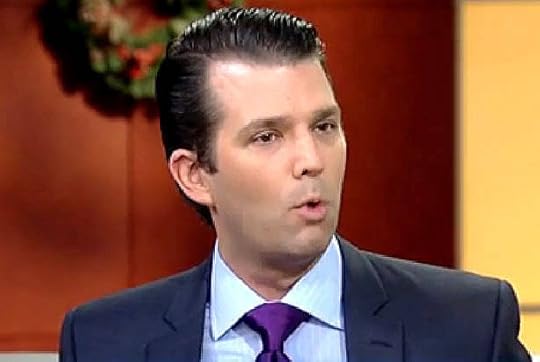
Donald Trump Jr. (Credit: Fox News)
Donald Trump Jr. delivered an impassioned, if a bit perplexing, speech supporting his father at the Republican National Convention on Tuesday.
The perplexing segments were largely the result of him having been raised by his mother after his parents’ divorce, as well as having attended boarding school instead of spending time with his father, so his “personal” anecdotes consisted largely of platitudes drawn from his father’s ghost-written, self-aggrandizing books and what he learned talking to Trump Sr.’s employees on work sites.
That’s not how Trump Jr. phrased it, saying instead that “when someone tells him it can’t get done, that guarantees it gets done” and that “when someone tells him something is impossible, that’s what triggers him into action.” He claimed to know that his father would be able to “fix the country,” because he was by his father’s “side on job sites and conference rooms from the time I could walk,” a statement which suggests that Trump Sr. wasn’t much of a parent — or would, if it were true.
Trump Jr. also claimed that his father “didn’t spend time in executive suites, he hung out with the regular guys on construction sites, pouring sheetrock and hanging — pouring concrete and hanging sheetrock.”
“His true gift as a leader,” he continued, “that they can’t even see in themselves. That he would trust his childrens’ formative years to these men and women says all you need to know about Donald Trump. We didn’t learn from MBAs — we learned from people who had doctorates in common sense.”
The crowd punctuated Trump Jr.’s speech with chants of “Trump! Trump! Trump!” even when the scion was favorably quoting former Democratic presidential hopeful Bernie Sanders about what is keeping wages low.
“It is all on the line”: Paul Ryan makes an awkward plea for a “conservative governing majority,” not so much Trump, at RNC
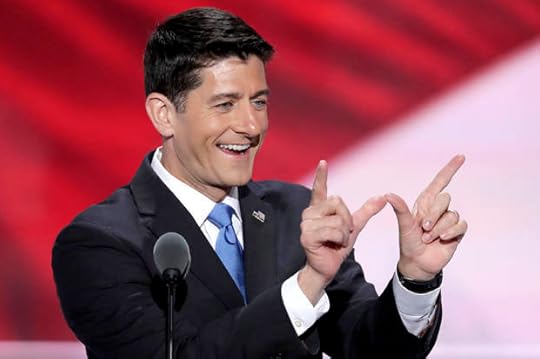
Paul Ryan speaks during the second day of the Republican National Convention in Cleveland, July 19, 2016. (Credit: AP/J. Scott Applewhite)
Well, that was an awkward, if not earnest, speech by the Speaker of the House Paul Ryan during night two of the RNC.
Ryan’s address to the Republican foot soldiers gathered in Quicken Loans Arena was meant as a pep rally after a opening night disaster of a plagiarism scandal and ahead of a competitive election this fall.
“Democracy is a series of choices,” he told the delegates. “We Republicans have made our choice. Have we had our arguments this year? Sure we have. You know what I call those? Signs of life. Signs of a party that is not just going through the motions, not just mounting, mouthing new words for the same old stuff.”
On “Make America Work Again” night of the convention, the speaker was sure to pepper his speech with an overtly negative outlook.
“For a country so ready for change, it feels like we have been cleared for takeoff and somebody announced we are all going back to the gates. It’s like we have been on hold forever, waiting to finally talk to a real person and somehow we have been sent back to the main menu,” he said.
“Watch the Democratic Party convention next week,” he said to the crowd, “that four-day infomercial of politically correct moralizing. It’ll be a reminder of all that is at stake in this election. You can get through four days with a little help from the mute button. But four more years of it? Not a chance. Not a chance.”
“The Republican Party stands as the great enduring alternative party,” he said. “We offer a better way for America, with reforms that actually work,” he said, before listing off the same conservative pablum of less regulation and lower taxes.
“None of this will happen under Hillary Clinton. Only with Donald Trump and Mike Pence do we have a chance of a better way,” Ryan said to cheers and applause. “And last point, let the other party go on and on with its constant dividing up of people. Always playing one group against the other as if group identity were everything. In America, aren’t we all supposed to be beyond class?”
“Whatever we lack going into this campaign, we should not lack for motivation,” Ryan said to end the speech. “In the plainest terms I know, it is all on the line. So let’s act that way. Let’s act that way.”
By the end of it, despite its boring beginning, Ryan energized the room and set-up his 2020 stump speech:
Well, Ryan doesn’t have to answer any more qts about whether he could possibly emerge from Cleveland as the nominee pic.twitter.com/fJTzKiYaGZ
— Scott Wong (@scottwongDC) July 20, 2016
Watch the boring address below:
“Let’s have some fun tonight!”: Chris Christie gets RNC crowd chanting “Lock her up!” and “Guilty!” in scathing speech about Hillary Clinton
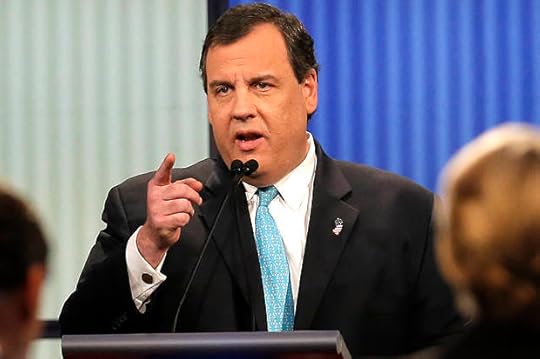
Chris Christie (Credit: Reuters/Jim Young)
New Jersey Governor and former prosecutor Chris Christie attempted to make an affirmative case for Donald Trump as the best possible candidate for president of the United States.
He opened by praising Trump as “a caring, genuine, and decent person,” before quickly shifting gears and saying that “this election isn’t just about Donald Trump, but about his opponent — Hillary Rodham Clinton.”
Christie claimed that the Obama administration has “refused to hold her accountable for her dismal record as secretary of state, so let’s do something fun tonight! As a former federal prosecutor, I welcome the opportunity to hold Clinton accountable for her performance and her character.”
He paused for a moment while the crowd chanted, “Lock her up! Lock her up!” Christie asked them “to hold on a few minutes, we’ll get there.”
“Since the Justice Department refuses to render a verdict, I’m going to present the facts against Hillary Rodham Clinton,” Christie said, before listing off every single region undergoing unrest in the world — Libya, Nigeria, China, Syria, Iran, Russia, and Cuba.
“Is she guilty or not guilty,” he repeatedly asked.
“Guilty!” the crowd unfailingly replied.
“She fights for the wrong people,” he claimed, “she never fights for us.”
Christie also claimed she was guilty of “putting herself before America” by setting up private email servers and “lying to the American people about her selfish, awful judgment about making [America’s] secrets vulnerable.”
He concluded the speech by encouraging the audience to chant “Guilty! Guilty! Guilty!” and called her “a sham we cannot promote to commander-in-chief someone who has made America more vulnerable with every decision she’s made.”
Donald Trump makes second unprecedented appearance at RNC before he accepts nomination
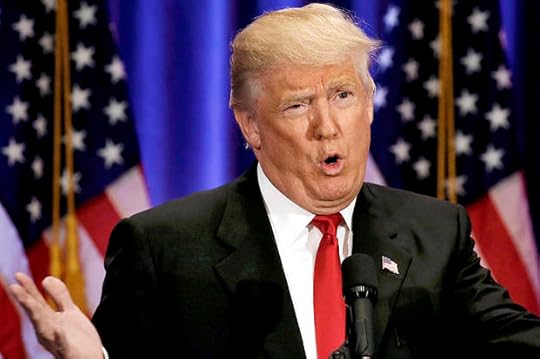
Donald Trump (Credit: Reuters/Mike Segar)
Donald Trump continued to buck precedent and appeared for the second consecutive night at the Republican National Convention — although unlike Monday, in which he briefly appeared to introduce his wife, on Tuesday he phoned in his appearance from Trump Tower in New York City.
Trump began by saying that Tuesday was “an unbelievable day, watching my children put me over the top and win the nomination.” He continued, saying that “a little over a year ago I announced my candidacy, and with your vote today, this stage of the presidential process has come to a close.”
Trump repeated his population-growth-based boast that he received more votes than any other primary candidate in history, before saying that it’s up to the GOP to help him transform his “movement” into a proper candidacy. “I’m so proud to be a nominee for president of the United States,” he continued, adding that “it is an honor to be running with Mike Pence, who will make a great, great vice president.”
He assured those in attendance that he would “bring back the leadership, bring back the jobs,” and “restore law and order, we have to restore, and just so many other things — I’ll be discussing that Thursday night.”
“Watching the GOP willingly commit suicide”: Twitter reacts to Donald Trump’s nomination
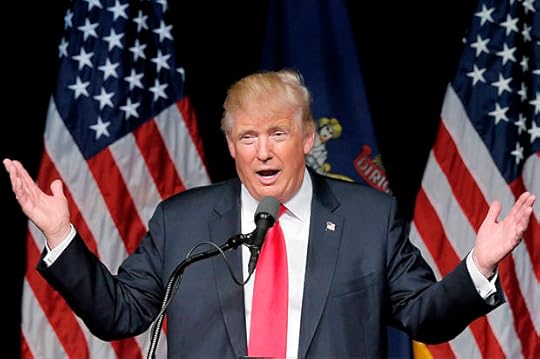
Donald Trump (Credit: Reuters/Brian Snyder)
It’s official: Republican delegates voted Tuesday to nominate Donald Trump as the party’s 2016 presidential candidate.
Despite the last-ditch efforts of anti-Trump activists, the roll call vote at the Republican National Convention in Cleveland ended with Trump receiving the 1,237 votes necessary to receive the GOP nomination. Rumors that rogue delegations would disrupt the proceedings with protest votes proved to be overstated, as the roll call passed without significant incident.
Trump's nomination proceeding with very little fuss. The rebellion dies with a whimper.
— Rosie Gray (@RosieGray) July 19, 2016
Trump received the decisive votes from his home state of New York. His son Donald Trump, Jr. made the delegation’s announcement.
"Congratulations dad, we love you!" pic.twitter.com/3Yz4whcvVG
— BuzzFeed News (@BuzzFeedNews) July 19, 2016
There it is. Donald Trump is the Republican nominee for president. (Imagine if someone told you that a year ago….)
— Ginger Gibson (@GingerGibson) July 19, 2016
The lack of enthusiasm on the floor as Trump secured nomination was startling
— John Podhoretz (@jpodhoretz) July 19, 2016
Anti-Trump conservatives were faced with the final realization of a year-long nightmare, during which Trump’s bombastic insurgent campaign proved unstoppable:
Still #nevertrump. Being the nominee doesn't change the fact he's a narcissist sociopath unprepared to manage a Waffle House.
— Rick Wilson (@TheRickWilson) July 19, 2016
Saddest day in long history of GOP. Nominating a racist, nativist, misogynist buffoon for office of Lincoln, TR, Ike, Reagan. #RNCinCLE
— Max Boot (@MaxBoot) July 19, 2016
Just amazing watching the GOP willingly commit suicide tonight.
— Erick Erickson (@EWErickson) July 19, 2016
I hope you're happy, Trump enthusiasts. Because what comes next is all on you. ALL OF IT.
— Ben Shapiro (@benshapiro) July 19, 2016
My grandfather was a lifelong GOPer. He got me into politics, showed me the virtue of conservatism. I'm glad he is not here to see this.
— Jay Cost (@JayCostTWS) July 19, 2016
Please. pic.twitter.com/EiYfxU6Idd
— Ben Domenech (@bdomenech) July 19, 2016
As delegates gathered for the roll call vote, news broke that Fox News CEO Roger Ailes would officially be removed from his post at the network amid sexual harassment allegations.
Trump is officially becoming the Republican Party nominee on the same night that Fox News seems to be imploding. Can’t script this.
— Gabriel Snyder (@gabrielsnyder) July 19, 2016
You all realize that, after Trump loses, he will hire Roger Ailes to run his new TV network, right?
— Josh Barro (@jbarro) July 19, 2016
Multiply Ailes’ $40 million golden parachute by 10 or 100, offer it to Trump, and he might drop out of the race voluntarily.
— Brian Beutler (@brianbeutler) July 19, 2016
Hillary Clinton’s Twitter account offered the following message:
Let's do this. pic.twitter.com/DtYYBDTWE6
— Hillary Clinton (@HillaryClinton) July 19, 2016
It’s official: Donald Trump is no longer just the “presumptive” 2016 Republican presidential nominee
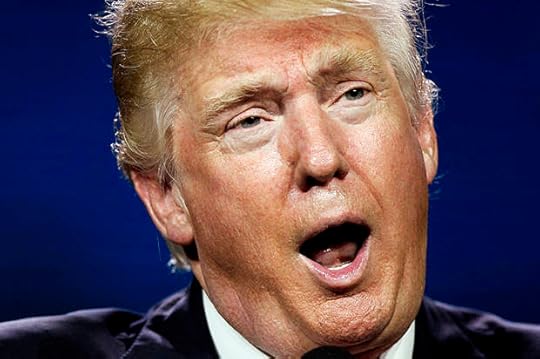
Donald Trump (Credit: Reuters/Rick Wilking)
Monday’s attempted coup by forces loyal to Texas Senator Ted Cruz and a swirling plagiarism scandal notwithstanding, the Republican Party took its roll-call vote Tuesday afternoon and decided that Donald Trump will, in fact, still be the GOP presidential candidate in 2016.
The nominating process began with House Speaker Paul Ryan welcoming Alabama Senator Jeff Sessions to the stage, who proceeded to compare America to trench warfare on the Western Front in World War I. He claimed that only Trump would be able to lead America out of these metaphorical trenches via his boasts of great strength. “The American voters heard this message and they rewarded his courage and leadership with a huge victory in our primaries,” Sessions said.
He added that Trump is “unfailingly courteous” and is “positive by nature,” possessing “tremendous energy and strength, and is a warrior and a winner. He loves his country and wants to see it be a winner again.”
The chairman of the Utah delegation, Phill Wright, told CNN’s Dana Bash that despite “arm-twisting” by party and Trump loyalists, he will be casting his state’s vote for Ted Cruz, who won the support of 78 percent of Utah Republicans in that state’s primary.
As should be obvious, the loss of his “presumptive” status does not mean that Trump has won over many of those within the party who don’t believe he can win in a general election, and Tuesday’s speeches — in particular, those by Senate Majority Leader Mitch McConnell and New Jersey Governor Chris Christie — will reportedly address the concerns of those aggrieved factions.
McConnell will apparently spend the majority of his speech reminding the assembled masses that the alternative to Trump is Hillary Clinton, whose perfidy is a long-established fact in Republican circles.
Christie told CNN earlier that he will be drawing from his experience as a prosecutor to “make a case” for Trump, which is as close to an affirmative defense as the candidate is likely to receive this week if Monday night’s focus on Benghazi and McConnell’s planned speech are any indication.
Steve King is very wrong: Here are 8 major contributions to civilization made by non-whites and non-Europeans (including civilization itself)
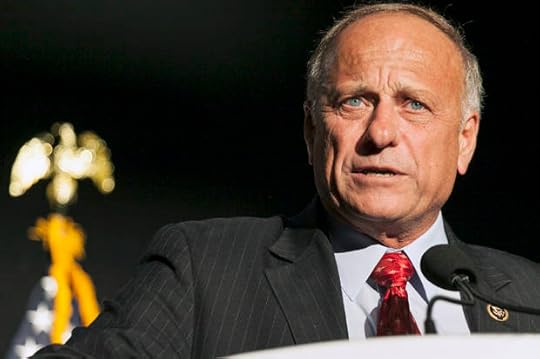
Steve King (Credit: Reuters/Brian C. Frank)
Congressman Steve King (R-Iowa) posed an interesting question during a panel on MSNBC Monday night.
Just moments earlier, Esquire’s Charlie Pierce had made a comment about “old white people” making up a majority of the GOP. In response, King fired back in white people’s defense. He asked, “ … Where are these contributions that have been made by these other categories of people that you’re talking about? Where did any other subgroup of people contribute more to civilization?”
When moderator Chris Hayes asked, “Than white people?”, King clarified: “Than Western Europe itself. That’s rooted in Western Europe, Eastern Europe, and the United States of America.”
To begin with, King’s use of the term “subgroups” is a racist one. Geographically, Europe and the United States make up only 17 percent of the global population and a significantly smaller land mass compared to the Africa, Asia, and others. Why, then, would the rest of the world be considered a “subgroup” to Europe and America? Why would it be considered “lesser?” In King’s worldview, European culture is obviously the superior one. But is it?
Historically, non-American and non-European “subgroups” like Asia, Latin America, Africa, and the Middle East are almost solely responsible for what we consider modern society – everything from language to mathematics to medicine. Don’t believe me? Here is a brief list of what “subgroups” (ie, nonwhites, non-Americans, and non-Europeans) have contributed to civilization:
1. Humanity
Evolution may be hotly debated among some members of the GOP, but fossil evidence shows that our early human ancestors originated in parts of Eastern and Southern Africa. In fact, most anthropologists believe that Neanderthals, Homo erectus, and Homo sapiens originated in Africa and then moved en masse through Northern Africa to parts of Europe, Asia, and the Americas.
2. Civilization
Thousands of years ago, human beings were nomads, venturing from place to place in search of shelter and food. But that all changed circa 8500 BCE, when humans started to settle in Mesopotamia and plant crops and domesticate animals. Pre-agricultural sedentary settlements started appearing in the Middle East and Japan – and yes, parts of Europe — around 12,000 BCE.
3. Citizen rule
Although Democracy is usually credited to the Greeks (“democracy” roughly means “rule of the people” in Greek), some historians posit that other ancient civilizations showed signs of “primitive democracy” long before the Greeks did. In ancient Mesopotamia, for example, Assyriologist Thorklid Jacobson uncovered evidence of all-male assemblies whose function was to debate issues that were of concern to the community, like going to war. Although not democracy in the modern sense, it was certainly a type of sovereignty by a “portion of the governed,” as Jacobsen says.
4. Written Law
At Monday’s GOP Convention, several speakers upheld the Republican Party as the party of law and order. It’s important to note, then, that actual law and order came about thanks to non-white, non-European culture. The Code of Hammurabi is the earliest known example of written law, originating in ancient Mesopotamia (in what is now present-day Iraq) and dating back to nearly 1800 years before the birth of Christ. These ancient Babylonian laws were written and preserved on large clay tablets and consists of 282 distinct laws, addressing property laws, military service, punishments, and inheritance.
5. Tools
The oldest stone tools predate the human species by about 70,000 years, and were recently discovered in a riverbed in Kenya (that’s Eastern Africa, not Eastern Europe, FYI). Scientists believe this tool was used for hammering or cutting.
6. Surgery
The origins of surgery can be traced as far back as ancient Egypt, where Egyptians practiced trephining, or drilling small holes in the skull, to relieve cranial pressure. Additionally, anthropologists have discovered drilled teeth dating back to 9,000 BCE in what is now India and Pakistan, while cataract surgery and plastic surgery are said to have originated in India, nearly one thousand years before the birth of Christ.
7. Numbers
The first example of mathematics can be traced back to the etchings on a bone found in Central Africa, dating back nearly 20,000 years. Now housed in a museum in Belgium, the etchings on the Ishango bone are thought to be a primitive numerical system or possibly even a lunar calendar. The numerical system as we know it today originated in India, between the first and fourth centuries.
8. Christianity
Although Christianity was spread on a global scale thanks to the Roman Empire, it is by no means a European invention. Not only was Christ himself an Aramaic-speaking Jew from Galilee, thanks to Jesus’ apostles, Christianity spread from Israel to Syria, Palestine, Iraq, and Egypt long before it became the official religion of the Roman Empire in 380.
This is by no means an extensive list. Other contributions made by “subgroups” include gunpowder, steel, fireworks, compasses, paper, astronomy, and countless more. Although “old white people” may be responsible for the GOP today, they are nowhere near responsible for humanity’s most important historical achievements.
The magic of Found, now in podcast form: “You feel like you are touching someone’s purest self”
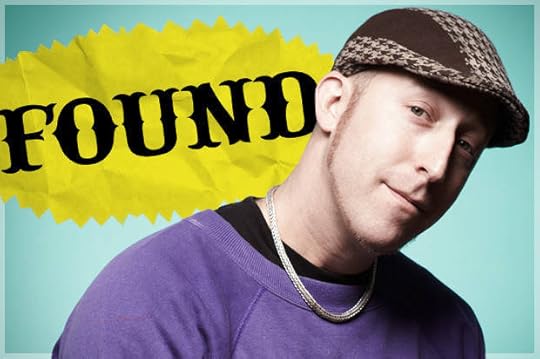
Davy Rothbart (Credit: Dan Busta)
One of the strange and wonderful developments of the 21st century is the Found phenomenon — a magazine that has become a spoken-word tour, a website, and even an Off-Broadway play. Collecting cast-off notes and letters, Found looks to frame little fragments of people’s lives that can be somewhere between funny and moving.
The latest version is a podcast which has just launched, with Found founder Davy Rothbart narrating 45-or-so minute episodes that get deep into a single story or theme. The first — and a new one will drop every two weeks — begins with a letter from a young man writing to Hollywood studio executives about his dream of becoming an Asian-American Oprah Winfrey. Rothbart begins with the original note and then tries to track the guy down.
To anyone who has somehow avoided the Found experience, the podcast — produced by Wondery, Killer Films Media, and “Found: The Musical” — is a good place to jump in.
Salon spoke to Rothbart from his home in Los Angeles; the interview has been lightly edited for clarity.
For those who’ve missed the last 15 years of cultural history: Tell us a little about the Found aesthetic — where it came from, what drew you to it, what kind of glimpse into the human condition these notes can offer?
Even as a kid I loved finding notes and letters: I grew up near a schoolyard, and they seemed to collect near the baseball diamond’s backstop. A note with a few lines scrawled can be a window into somebody else’s life.
They do give you insight into the human condition. Part of the reason they’re so raw and revealing is there’s truth and authenticity to them. A lot of what is presented to us is managed: Social media is a curated version of what we want to project. A letter is intended for an audience of one person. And some of these are journal entries. When you read them you feel like you are touching someone’s purest self.
For me it started with a note on my windshield addressed to someone named Mario. A love note from a girl named Amber. I thought a magazine would be a great way to share what people were finding, and it grew way beyond what I imagined. I feel like I’ve experienced thousands of other lives through these letters.
And the podcast takes it further along?
The podcast came because sometimes people recognized a note they’d written, and talking to the actual people could be mundane, or it could be more fantastic and unusual than what we could imagine… There are some notes I’ve wondered about for 10, 15 years.
A podcast is a distinctly digital-age kind of culture. But does your work get harder as we leave the material, analog world of written communication behind?
People are writing less notes now — but the way we can find things has multiplied. You might get an email sent to the wrong address. Instead of finding a note in the gutter, you might find a telephone with 50 pictures on it.
And if people have something really heavy to express, they often put pen to paper. I have friend who is a real purist, who says it has to be a piece of paper blowing down the street.
Your episode on a guy who wanted to become the Asian Oprah Winfrey had some classic storytelling elements — a little American dream, a little disappointment and compromise, a few surprise twists. Why did it seem like the story you wanted to launch your podcast with?
There were a lot of themes I could relate to. If I laugh at a note, it’s usually because I’m laughing at myself. We all have grand dreams; that’s something we all can relate to.
I feel like all the Hollywood stories we hear are the opposite — the guy who works at a pizza place and dreams of becoming a rapper. But I realized, there’s something kind of noble about adjusting our dreams, doing something positive in our communities. I love the story Jet tells about driving across the country, looking at the mountains and stars. I love the idea of someone giving up their dream to pursue another path.
But these are all real mysteries to me — I have no idea how they will turn out. That’s part of what’s exciting to me about them. We feel a bit like amateur detectives.
I don’t want to give it away, but this episode has a more-or-less happy ending with a sense of uplift. Will most of the episodes be like that, or will there be some that are grim or dangerous or scary?
Some of the stories we’re gonna explore will have some darkness or sadness to them. That’s what people write about, on these notes blowing down the street. I don’t want to make an episode that is mercilessly bleak. And people can talk about these things with joyousness and humor.



